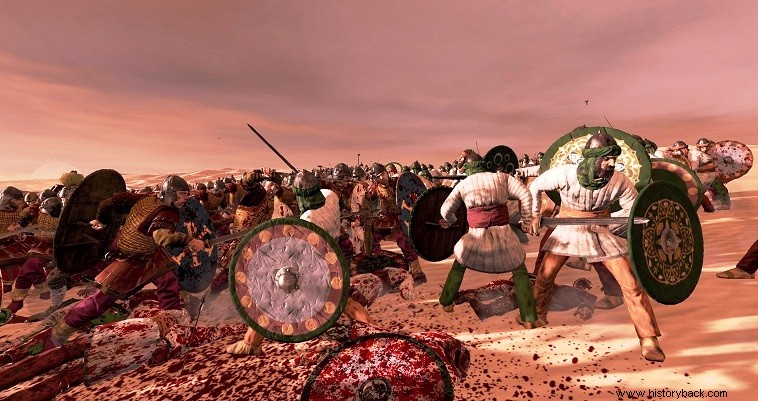
In 945 AD the great Arab general Saif al-Dawla created his own emirate based in Aleppo, becoming the main rival of the Byzantine Empire in the region of upper Syria. In the region, a continuous war was fought with raids and plundering on both sides.
In the early summer of 960 AD. al-Daulah decided to invade Byzantine territory taking advantage of the absence of the best Byzantine troops in Crete in the campaign to liberate the island.
The Arabs slaughter and plunder
al-Dawlah divided the forces into two divisions. He himself with the strongest invaded Byzantine territory through Cilicia, while the other carried out a counter-distraction attack. The response to the Arab invasion was assigned to general Leo Phokas, Domestic of the Schools of the West (commander-in-chief of the European provinces), who had just crushed the Hungarians in Thrace. Leo Phokas, due to the absence of his brother Nikiforos Phokas in Crete, he was sent to Asia Minor to face the Muslims.
Al-Dawlah's army – about 30,000 men – had meanwhile advanced as far as the Harsian Theme in central Asia Minor. The Arabs captured the city of the same name and massacred the garrison, looted and burned the surrounding area and captured many of the inhabitants. At the end of autumn the victorious Arab army made its way back laden with booty and carrying thousands of prisoners, as reported by the Byzantine historian Leo the Deacon.
In the meantime, Leo Phokas, as his army was lagging behind dramatically, according to the Arab sources - who do not mention numbers, however - decided to resort to ambush tactics. After joining his forces with those of his uncle and general of the subject of Cappadocia Constantinos Melainos, he occupied the narrow pass of Kylindros in the southwest of the Taurus mountain range in Cilicia, in the region of Andrassos.
The Byzantines captured a local fortress while the bulk of his forces hid in the pass. al-Dawlah had passed through the pass in question at the start of his raid. On the way back his generals advised him to take another path. He, however, overestimating his powers, arrogantly rejected their suggestions and moved on the same path.
An army in a cage
On November 8, 960 AD Day of the Brigadier Generals' Feast , the Arab army entered the pass unsuspectingly breaking their formations so that they could move through the strait. The Arabs, carrying booty and captives as well, moved disorderly over the rough terrain.
When the entire Arab phalanx was inside the strait, Leo Phokas gave his men the signal to attack. With the trumpets sounding and the soldiers chanting "Lord Mercy", the Byzantine army marched in. Other soldiers rolled rocks and tree trunks, "sealing" the entrance and exit of the strait.
The Arab hypocrites did not know what to do. Those who tried to fight were mercilessly slaughtered. Most laid down their arms and surrendered. al-Dawlah just managed to escape from the trap with the help of an outsider who gave him a horse.
All the Christian captives of the Arabs were released and all the booty they had seized was taken over by the Byzantines. The Arab slaughterers, now captured, ended up as slaves to work in the fields of the Byzantines.
According to the sources, only about 300 of al-Dawlah's men escaped the destruction and followed him. Among the Arab captives it seems that there were also relatives of the emir and high-ranking officials of his state.
Leo Phokas, after supplying the former captives of the Arab Christians with food, led them to return to their territories. The great victory was celebrated in triumph in Constantinople with the Arab captives marching in chains .
Revenge
The battle of Andrassos was an example of a successful ambush and was included in the Byzantine manual of "special operations" under the title "On Ambush" which was written around 970 AD. by Nikiforos Fokas. The Battle of Andrassos was celebrated as a triumph of Christianity over Islam. And while the Byzantines celebrated, the crescent mourned.
Soon things would get worse for the Arabs as Nikephoros Phokas liberated Crete and returned to Asia Minor... The future emperor in 961 AD. attacked al-Dawlah's emirate leveling everything in its path. Phokas with 70,000 men defeated the Arabs he encountered and arrived outside Aleppo.
The Byzantine army captured the city and razed it to the ground, with the exception of the citadel that survived. This victory crushed the strength, both physical and political, of al-Dawlah, who died of illness in 967 AD. after new victories of Nikiforos Fokas.
